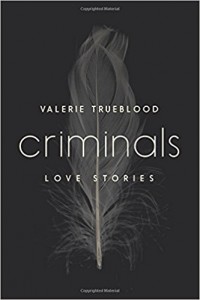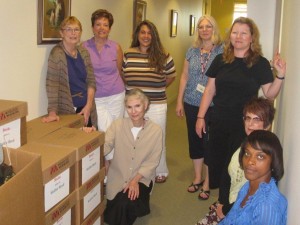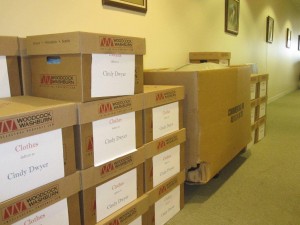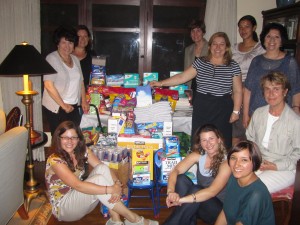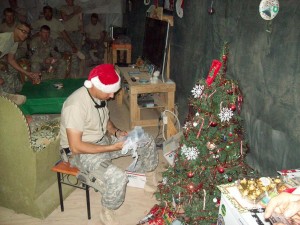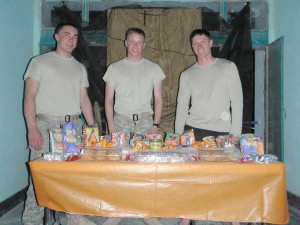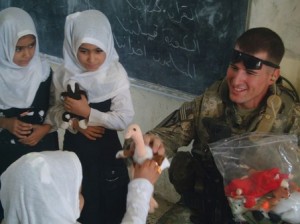Valerie Trueblood’s Criminals
I love to read. But the older I get the more critical I am of words on the page, and the more willing I am to put a book down unfinished, in a way that my younger self, that (pre-childrearing) self, who thought she had endless time ahead, would never have dared do. Now I find myself impatient with other people’s words unless, well, the writing is amazing. Occasionally I come across a book that clutches me by the core and demands that not only must I read from beginning to end TWICE, but I must tell every other person who loves words to read it too. And the book that most recently possessed me so thoroughly was Valerie Trueblood’s Criminals.
No one writes like Trueblood. Her books (I have read her three story collections, as well as her novel) are not ‘easy’ reads. The tales are intense, complicated, sprawling, multi-layered. There are mentions of Frost and Whitman. There are times when I begin a story and feel as if I’m blinking at disparate puzzle pieces, but slowly, expertly, Trueblood gently guides those pieces together and the image/epiphany that snaps together is worth every ounce of close reading I had to do get there.
My favorite story in Criminals is “Skylab.” In thirty pages, Trueblood manages to do everything I tried to do in my three hundred page novel, The Confusion of Languages. It’s the story of Amy, a newlywed nurse who falls in love with a much older, married doctor. The two flee America together, leaving damaged families behind, and land in Malaysia, where everything, from stray dogs to bumble bees to random cans of hairspray, are not what they seem. Amy, suddenly unmoored from a capable life that gave her meaning, feels an unfathomable, Shakespearean guilt, and their love, which had seemed so vital and epic in the hospital where they had met and hatched their escape, is suddenly no match for the misery the affair has set into motion. And all along a satellite, the doomed Skylab, careens off course just as surely as Amy does, the trajectory marred and flawed, now dangerously flailing, falling, and the best possible outcome is that no one will be killed by its plummet.
Criminals is full of stories about unexpected passions, of people trying to do the right thing and failing again and again, of heart break and insecurity, of flaws and attempts at redemption. In other words, it’s about every person you’ve ever known. When I read Valerie Trueblood, I want to write better, wiser, more resonate fiction. And in some strange way but beautiful way, when I read Valerie Trueblood, I also want to be a better, wiser, more resonate human being.
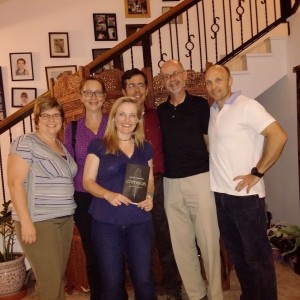
In typical Siobhan-smitten fashion, I chose Valerie Trueblood’s Criminals for our most recent embassy book club, hosted at my home (I didn’t think to take the photo above until most of the book club had already left, darn it!). The night was fantastic, my husband, KC, who’s a sharp reader, said it was the best book club discussion we’d ever had. It also gave us a great opportunity to email a few questions to Trueblood, who was so lovely to provide these indepth replies:
1. Would you mind giving us a little biographical information? Did you ever live abroad, especially in a Muslim majority country, similar to Amy’s time in Malaysia in Skylab? And the details in Astride are so amazingly specific (the typewriter tape!), did you intern at the Pentagon in the sixties? If so, how did those experiences inform your stories, and if not, how did you research and develop such settings and details?
My father grew up in a farm family, but became a geographer with an Asian specialty (Burma) and taught for several years at the University of Rangoon. There he met my mother, a Yorkshire missionary’s daughter who was teaching zoology. She was known thereabouts for her beauty and their story was the first romance I heard and loved. They left Burma when WWII began, and he went to work for Army intelligence in D.C., commuting fifty miles from our rural home in Virginia. I was one of their four children, and had the long happy childhood people say does not produce writers.
I can honestly say I always wanted to write stories. I didn’t even want to; I was more or less at the mercy of the scenes populating my mind, and hijacking it in grade school once I got there. I would sneak off to tell them or act them out aloud when I thought I was alone—a family joke, as it wasn’t easy to be alone in a family that size. We had no TV (my English mother thought it was an American notion and would go away), but stories were everywhere in that part of the South, in all the talk in stores, in the sermons, coming over the P.A. system in high school, in visits from the doctor and the milkman, the vet and the occasional drifter coming down the B&O railroad tracks needing food. Everybody had stories. And there was the glorious radio with its serials and soaps—X minus 1, Helen Trent, Sergeant Preston, The Shadow.
Do I write anything resembling these things? No. But I do hear the voices of Virginia always, and I remember the stories, the gentle ones told to instruct us but more particularly those of disaster—barns afire, ordeals of weather & crops, rogue animals who jumped gates or trampled their owners, murders, revenges taken, children sledding into cars. I’m sure they deepened my interest in how people cope with what happens rather than how they cause what happens.
I attended the county high school with a superb Latin teacher, Mrs. Lillian Bridges, who made me love the Aeneid and go off to college planning to major in Classics. At Brown I fell under the spell of the avant-garde novelist John Hawkes. Writing classes were a rarity then, and his was an ordeal by fire for the provincial I was. Why he encouraged me I don’t know. Then John Berryman had a year there as visiting professor, and his blazing mind was a guide for my own stumbles into language.
I did intern in the Pentagon; I did live with my husband in Malaysia when he taught at the Universiti Malaya. My circumstances weren’t those of the characters in my stories, and never have been, although no one can write fiction scrubbed of what’s been seen, known, experienced and felt in her/his own life.
2. There is a feeling of Hemingway in your stories – the prose and especially the dialogue is very lean and makes the reader work. Do you have a deliberate process that you use to cut and trim your stories or do you write the stories as they generally appear on the page?
I’m chuckling at the mention of Hemingway, though the Nick Adams stories meant a lot to me, and the novels were what we read in American lit classes back then along with Fitzgerald and the newcomer Flannery O’Connor. The leanness in my stories is probably due to cutting rather than to luck with a draft or not having drafts at all. I have them and they go on changing for years. That can be good or bad!
I do love dialogue, what people really say, and I hurry to get it written down when I hear it. The country voice in particular is music to me, from any region of the U.S., and it will well up in my own speech I’m told. Like many writers I’m an awful eavesdropper. I love the things people say in cafes and gas stations and at my son’s gigs in dive bars, but also what they say—we say—when we are at the extremes of emotion in our yards and kitchens and bedrooms, or when we’re hopeless and trying to find a truthful answer or an extenuating lie.
3. Most of these stories seem to be from the point of view of women. Not to say that they paint men in a bad light, since it’s the women who often stir up the trouble, but we have less insight into the male mind. Did you deliberately try to write stories from the female point of view?
You’re right that I more often write in the voice of or from the perspective of a female character, but I do have quite a number of stories (not all yet published) from the point of view of a male, and I find that no matter what the difficulties are, my female characters are usually very sympathetic to the male. I think the human predicament is just that, and even as a feminist I would not want to weigh the sufferings of one sex against those of the other. In CRIMINALS, the stories “His Rank,” “You Would Be Good” and “The War Poem” take place in the sore hearts of men.
In every other story in that book (I think, I hope) the problems of the males, including the young boy as well as the bodyguard in “Sleepover,” are close to the center of the story and bring out a fierce, if frustrated, tenderness in the female protagonist. In “Astride,” the Ukrainian Orlenko isn’t just a foil for the maturing process of two American girls, but the source and victim of the story’s action. In “Skylab” the young woman endures and externalizes all the pain of her husband’s acts and choices as well as her own. But that’s just how I see it; I’m sure there are other interpretations, and I’d love to hear them. It will be enlightening and helpful to me to hear how readers react to this question and to these characters!
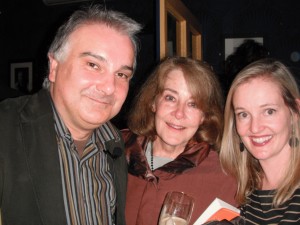
Cork International Short Story Festival, 2011. Patrick Cotter, poet & festival organizer, Valerie Trueblood, and me, clearly thrilled to meet one of America's finest short story writers
(For more on Cork International Short Story festival, see my blog from September 2011: http://siobhanfallon.com/blog/?m=201109)
